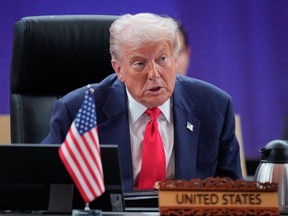
Contents of the article
KUALA LUMPUR, Malaysia (AP) — A trade deal between the United States and China is moving closer, officials from the world's two largest economies said Sunday, reaching an initial consensus for President Donald Trump and Chinese leader Xi Jinping to be finalized during their high-stakes meeting.
Advertisement 2
Contents of the article
Any agreement would be a relief to international markets, even if it does not address underlying issues related to production imbalances and access to the latest computer chips.
Contents of the article
Contents of the article
Beijing recently restricted exports of rare earth elements, which are needed for advanced technologies, and Trump responded by threatening additional tariffs on Chinese products. The prospect of wider conflict threatened to dampen economic growth around the world.
China's top trade negotiator, Li Chengang, told reporters the two sides had reached a “preliminary consensus” and Trump's Treasury Secretary Scott Bessent said there was a “very successful framework.”
Trump also expressed confidence that a deal is close, saying the Chinese “want to make a deal, and we want to make a deal.” The Republican president is set to meet Xi Jinping on Thursday in South Korea, the last stop on his Asia trip. Trump confirmed he plans to visit China in the future and suggested Xi could come to Washington or Mar-a-Lago, Trump's private club in Florida.
Advertisement 3
Contents of the article
Bessent said on CBS's “Face the Nation” that the threat of additional higher tariffs on China is “virtually not on the table.” In interviews with several U.S. news shows, he said talks with China had led to initial agreements to stop fentanyl precursor chemicals from entering the U.S. and that Beijing would make “substantial” purchases of soybeans and other agricultural products while delaying controls on rare earth metals exports.
Progress toward a potential agreement came during the annual summit of the Association of Southeast Asian Nations in Kuala Lumpur, where Trump sought to burnish his reputation as an international mediator.
However, his way of making deals has led to major disruptions at home and abroad. His import taxes have worsened relations with trading partners, and the U.S. government shutdown has put him at odds with Democrats.
Contents of the article
Advertisement 4
Contents of the article
Trump attends ceasefire ceremony between Thailand and Cambodia
At the summit, Thailand and Cambodia signed an expanded ceasefire agreement during a ceremony attended by Trump. His threats of economic pressure prompted the two countries to end skirmishes along the disputed border earlier this year.
Thailand will release Cambodian prisoners and Cambodia will begin withdrawing heavy artillery as part of the first phase of the agreement. Regional observers will monitor the situation to prevent a resumption of hostilities.
“We did what many thought was impossible,” Trump said. Cambodian Prime Minister Hun Mane called it a “historic day” and Thai Prime Minister Anutin Charnvirakul said the agreement creates “the building blocks for lasting peace.”
Advertisement 5
Contents of the article
The president signed economic agreements with Cambodia, Thailand and Malaysia, some of which were aimed at increasing trade in critical minerals. The United States wants to rely less on China, which has used restrictions on exports of key technology components as a bargaining chip in trade negotiations.
“It is critical that we work with each other as willing partners to ensure that we can have uninterrupted and secure supply chains for quality of life, for our people and for safety,” said U.S. Trade Representative Jamison Greer.
Trump renews engagement with key world region
Trump attended the summit only once during his first term, and US Defense Secretary Pete Hegseth appeared unfamiliar with ASEAN during his confirmation hearings in January.
Advertisement 6
Contents of the article
This year's event was a chance for Trump to reengage with the countries, which have a combined economy of $3.8 trillion and a population of 680 million.
“The United States is with you 100%, and we intend to be a strong partner and friend for many generations to come,” Trump said. He called his colleagues “extraordinary leaders” and said that “everything you touch turns to gold.”
Trump's tariff threats have helped speed up negotiations between Thailand and Cambodia. Some of the worst modern fighting between the two countries occurred over five days in July, killing dozens and displacing hundreds of thousands of people from their homes.
The president then threatened to suspend trade agreements if the fighting did not stop. An uneasy truce has remained in place ever since.
Advertisement 7
Contents of the article
Malaysian Prime Minister Anwar Ibrahim praised the Thailand-Cambodia agreement, telling the summit that “it reminds us that reconciliation is not a concession, but an act of courage.”
Tariffs in focus during Trump trip
Trump met in Kuala Lumpur with Brazilian President Luiz Inacio Lula da Silva, who also attended the summit. The two have clashed over the prosecution in Brazil of Jair Bolsonaro, the country's former president and close Trump ally. Bolsonaro was convicted last month of trying to overturn his country's election results.
During their meeting, Trump said he might reduce tariffs on Brazil that he had imposed in an effort to be lenient with Bolsonaro.
“I think we can get some good deals for both countries,” he said.
Advertisement 8
Contents of the article
While Trump liked Lula, he avoided Canadian Prime Minister Mark Carney. The president is angry with Canada over television ads protesting his trade policies and announced on social media on his way to the summit that he would raise tariffs on Canada because of it.
One of the leaders absent from the summit was Indian Prime Minister Narendra Modi. Although he was close to Trump during his first term, their relationship has become more strained recently. Trump raised hackles by boasting that he had resolved the recent conflict between India and Pakistan and raised India's tariffs on Russian oil.
Contents of the article







